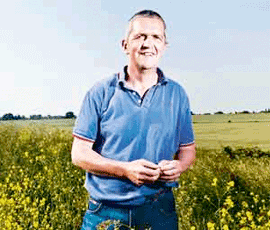Backyard farming is a step backwards

A headline opposite the problems’ page in one of Mrs Smith’s magazines caught my eye the other day. “Is growing your own food the new sex?”
I couldn’t help but think: “What is it with this current media obsession with encouraging people to grow their own food and, anyway, what’s wrong with the old sex?”
Now, I know what you’re thinking – why was I reading Cosmopolitan in the first place? But don’t think that because it’s not the point I’m trying to make, instead concentrate on the issue of who should be producing food, professional farmers or backyard amateurs?
Firstly, let’s be clear, I’m not having a go at gardening. I fully recognise the therapeutic joy that can be engendered from a lovingly tended garden. Indeed I’m seldom happier myself than when I’m foraging with Mrs Smith on a summer’s eve amongst the ripe melons and juicy raspberries. But leaving the sense of well-being to one side, it’s the stuff about home-grown food being better for you and better for the environment than farm-produced produce that needs challenging.
Admittedly as a farmer, I have a vested interest. Just as a plumber would advise against a DIY enthusiast repairing their central heating and a dentist would warn people not to extract their own teeth, you can understand why farmers might suggest food production should, in the main, be left to them.
But food excites deep passions so it’s no use farmers just being condescending about this, we need properly thought-through arguments. So firstly, let’s examine the idea that home-grown food necessarily has a lower carbon footprint. While it is true that an allotment isn’t home to hulking great, diesel-burning, machines like farms, it is worth pointing out that vegetable patches produce relatively little; indeed they are never going to produce anything close to our food needs. We should also remember that gardening is seldom undertaken without burning fossil fuels. A smoke-belching rotavator may well burn more calories than it helps to grow. Furthermore if Mr and Mrs Jones take the 4X4 for a spin to the out-of-town garden centre to buy a packet of lettuce seeds then the resulting plants will have started off life with a fairly substantial carbon footprint.
Then there is the idea that home grown is in some way healthier. When you consider in suburban Britain there are 10 million cats and dogs looking for somewhere to relieve themselves every three hours, you could argue that food grown on remote farms might be less at risk of certain forms of unwholesome contamination.
Then there is this new rage for keeping chickens in back gardens so people can enjoy a home-made egg. Call me a scaremonger, but I reckon the salmonella risk is going to be greater in a random amateur environment than it is in a professionally run, inspected, disinfected, rat-free, poultry shed. Personally I wouldn’t risk an egg from a back garden unless it had been boiled to the point where you could bounce it off a wall.
And just to prove I’m not exaggerating the possibility of backyard farming getting out of hand – try putting “bake your lawn” into a search engine. You’ll find websites encouraging people to rip up the flower-beds, bulldoze the children’s climbing frame and start growing wall-to-wall wheat in their back gardens. The only sensible response to that is a seasonal one – bah and humbug! Merry Christmas.
Guy Smith comes from a mixed farming family on the north-east Essex coast. The farm is officially recognised as the driest spot in the British Isles. Situated on the coast close to Clacton-on-Sea, the business is well diversified, with a gold course, shop, fishing lakes and airstrip.
What do you think about backyard food production? Have your say on our website forums.
Read more from all our Opinion writers.
